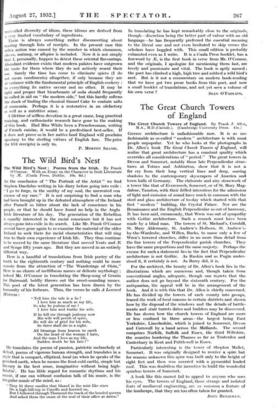The Wild Bird's Nest
The Wild Bird's Nest : Poems from the Irish. By Frank O'Connor. With an Essay on the Character in Irish Literature by 2E. (Cuala Press, Dublin. 10s. 6d.) AT the conclusion of " The Portrait of the Artist " we find Stephen Daedalus writing in his diary before going into exile : I go to forge, in the smithy of my soul, the untreated con science of my race." It is not surprising to find a man who had been brought up in the defeated atmosphere of the Ireland after Parnell so bitter about the lack of conscience in his people, or that he should have found no help in the Anglo Irish literature of his day. The generation of the Rebellion is equally interested in the racial conscience but it has not always gone into exile in its search. Like Mr. Frank O'Connor several have gone again to re-examine the material of the older Ireland to seek there for racial characteristics that will ring true to their own experience of Irish life. They thus continue to be moved by the same literature that moved Yeats and .E and Synge fifty years ago. But they are moved in an entirely different way.
Here is a handful of translations from Irish poetry of the tenth to the eighteenth century and nothing could be more remote from the attraction of "The Wanderings of Oisin," Here is no charm of mellifluous names or delicate mythology ; indeed Mr. O'Connor in translating the Sleep-song of Grania for Dairmuid, boldly throws out the sweet-sounding names. This poet of the latest generation has been drawn by the humanity of his forbears. Thus, the verses he calls A Learned Mistress "Tell him the tale is a lie !
I love him as much as my life, So why be jealous of me ? I love him and loathe his wife.
If he kill me through jealousy now His wife will perish of spite, He will die of grief for his wife, So three shall die in a night.
All blessings from heaven to earth On the head of the woman I hate, And the man I love as my life, Sudden death be his fate !"
He translates the poems of passion, patriotic melancholy at defeat, poems of vigorous human strength, and translates in a style that is compact, elliptical, local (as when he speaks of the perished earth, when he means the frost-cold earth), simple but literary in the best sense, imaginative without being high- falutin'. He has little regard for romantic rhythms and his music, if one can without confusion talk of his music, is the irregular music of the mind, as :
"They lit three candles that blazed in the mist like stars On a high-hill-top in Conello and hurried on, But I followed through Thomond the track of hooded queens And asked them the cause of the zeal of their office at dawn." In translating he has kept remarkably close to the originals, though—discretion being the better part of valour with an old language—he has frequently preferred the essential meaning to the literal one and not even hesitated to skip verses the scholars have boggled with. This small edition is probably exhausted even as I write. It is a Cuala Press booklet, has a foreword by 1E, is the first book in verse from Mr. O'Connor, and the originals, I apologize for mentioning them last, are lovely and passionate and vital. The book is aptly named ; the poet has climbed a high, high tree and robbed a wild bird's nest. But is it not a commentary on modern book-reading that we have got two prose books from this poet, and now a small booklet of translations, and not yet seen a volume of


























 Previous page
Previous page